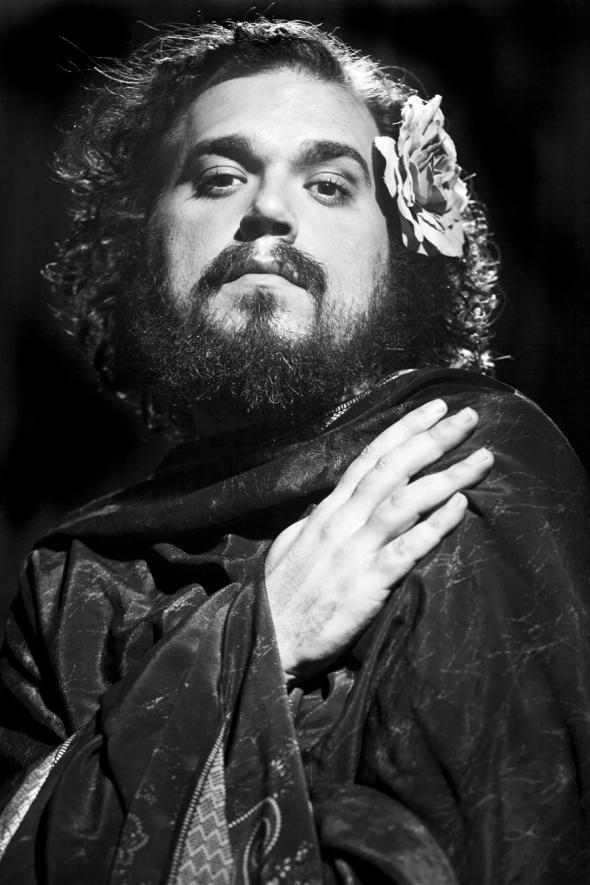Through his work as a writer, performer, podcast host, and general queer-about-town, Justin Sayre has established himself as one of the leading explorers and communicators of gay culture working today. (Outward interviewed him about his work in 2013.) A new collection of monologues from Sayre’s monthly variety show, The Meeting* of the International Order of Sodomites, is now available for download. The album liner notes are reprinted below.
It is generally advised, when on the giving side of a blowjob, to begin one’s work with an offering of praise—an approving comment on size, perhaps, or a wicked flash of the eyes. On the seventh track of this collection, Justin Sayre suggests a different approach: an invocation of the gay ancestors to bless the oral sacrament. “This one goes out to Oscar Wilde!” he cries up to our smiling forefathers, just before going down.
That Sayre invites Wilde to watch is no surprise; their verbal talents and aesthetic sensibilities are so in tune that one assumes their taste in men must align as well. Indeed, when I reflect on the material in this exquisite curio of Sayre’s stand-up routines from The Meeting* of the International Order of Sodomites—which careens thrillingly from gala evening sparkle to opium den vulgarity—I can’t help but think of Wilde, and in particular a line from Lady Windermere’s Fan: “We are all in the gutter, but some of us are looking at the stars.”
In the play, this aphorism is a comment on the fallen nature of the male sex. But it has a particular relevance to the gay experience, one that from Wilde’s time well into the 20th century saw the fairies rather miraculously refashioning the gutter into which society had cast them into a twinkling and influential subculture. Sayre, more than any contemporary queen I can think of, is schooled in this history—and due to that erudition, painfully aware of how it seems to be slipping away.
There’s a melancholy lurking beneath the spritely humor of this album, a creeping sense that today’s gays have, tragically, made for themselves a new kind of gutter. “Sometimes I think people have forgotten all the good stuff,” Sayre worries in “Letters to the Chairman.” Even as our lives are increasingly enriched by legal dignity, our contemporary culture feels somehow impoverished. It’s this concern that fuels the preservationist impulse of the IOS—something is lost if young queens no longer understand (if not viscerally, at least intellectually) the terrible importance of Judy and Joan or the semiotic richness of the hanky code.
But these aren’t just the rearguard rantings of a bitter old queen mourning her divas. Sayre, with classic “spoonful of sugar” subversion, levels serious criticisms of certain “respectable” values that have gained prominence in gay life in the wake of the AIDS crisis. “The future looks bleak, ladies and gentlemen, when you’re sitting in a gay bar and some 22-year-old is thinking God, I just wanna settle down and meet Mr. Right,” the chairman laments while discussing the threat of gay marriage. “The only thought in a 22-year-old’s mind should be why do I still have these pants on?” Later, Sayre admits it’s not holy matrimony and settling down that he objects to, per se; it’s just that gays used to have more interesting thoughts in their heads—thoughts that, instead of comforting the world that its institutions and expectations were right and desirable, made the world nervous in the best possible way.
“You people used to be the arbiters of style. You used to be the Truman Capotes, the Oscar Wildes,” Sayre mock-scolds in “Lady Gaga and Miley Cyrus.” Within that chastisement—and indeed, within the very concept of a secret international cabal of faggots—lies a hope: Gays have used their unique perspective, their “gutter vision,” to great effect in the past. We could again. But to do that, we need to spend less time coveting our straight neighbors and more time looking to our own culture for models of how to be. As Sayre eloquently puts it in “Valley of the Gays,” our people have managed, against incredible odds, to produce a glittering cultural constellation of “vibrancy and wonder.” There’s real pride to be taken in that, and power, too. Sayre’s great contribution is to remind us that even when it seems dim, that legacy, like the stars, is never gone—you just have to look a little harder.
